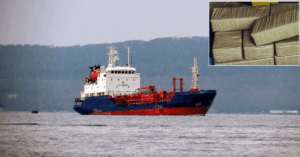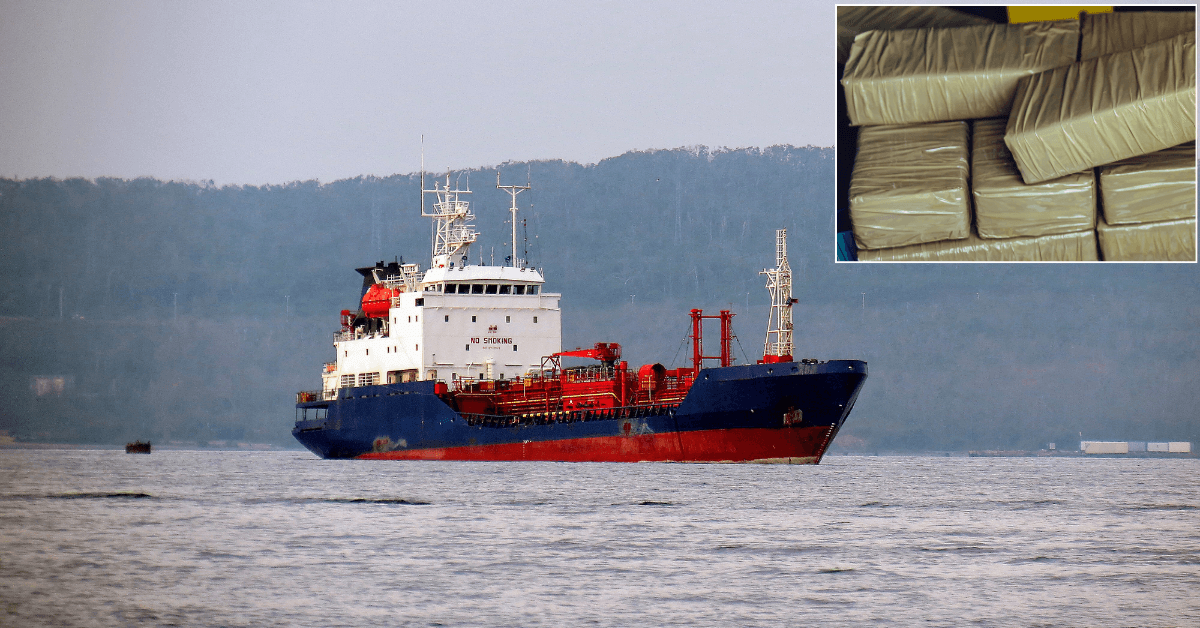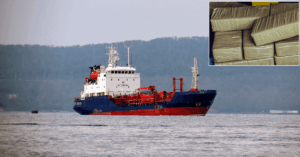
Konecranes Delivers Special Crane Solution For UK’s New Shipbuilding Facility
June 27, 2025
Hong Kong International Convention For Safe Ship Recycling Enters Into Force
June 27, 2025

Five crew members from the product tanker Scot Bremen were arrested this week in Belgium after a large quantity of cocaine was found on board the ship.
The arrests were made after the ship’s captain reported suspicious activity by the crew, which led to a search by Belgian customs officials in the port of Zeebrugge.
The Maltese-flagged tanker, operated by a Turkish company, had been traveling from the small Brazilian port of Pecem and arrived off the coast of Ostend, Belgium, on Friday, June 20. The vessel anchored offshore to wait for a pilot before entering port.
On Sunday, two days after anchoring, the ship’s captain discovered that five sailors were hiding suspicious packages. He immediately informed the Belgian authorities, canceled the pilot’s boarding, isolated the five crew members in their cabins, and secured their mobile phones as evidence.
Due to poor weather conditions, police could not board the vessel at sea. The ship stayed at anchor until Monday evening, June 23, when it sailed to Zeebrugge.
At the port, customs officers carried out a detailed inspection and found what they described as “significant quantities” of cocaine on board. While the exact amount and location of the drugs were not revealed, Belgian and international media reports described the find as being in the range of “hundreds of kilos.”
All five crew members involved were taken into custody by the Belgian police. The captain, who had reported the incident and cooperated fully, was questioned as a witness and later released.
The company operating the ship, Scot Tankers, stated that both the police and public prosecutors commended the master’s actions in securing the evidence and aiding the investigation.
The ship remained moored at Zeebrugge until Thursday, when replacement crew members joined the vessel. It is now cleared to continue its commercial journey to the Belgian town of Zelzate, its next port of call.
In a separate incident that may be linked, eight men were arrested at a marina in Blankenberge on Sunday night. Authorities saw them attempting to launch a rigid-hulled inflatable boat from the marina, which is located roughly 15 nautical miles from the tanker’s anchorage.
Belgian media outlets suggested that these men were suspected of trying to reach the tanker offshore to retrieve the hidden cocaine.
The West Flanders public prosecutor’s office confirmed both the arrests in Blankenberge and the cocaine found aboard the ship but stated that it was too early to say if the two incidents were directly linked. The eight suspects have been placed under investigation on suspicion of forming a criminal gang.
The Scot Bremen is a 2003-built 8,200-dwt chemical and oil products tanker. Formerly known as Wappen von Bremen, it was purchased in 2015 by a Turkish ship manager as part of a series of specially-built vessels.
The ship usually operates between North America, Northern Europe, and the Mediterranean, but records show it made two visits to Pecem, Brazil this year, one in April and another in early June.
Pecem, a smaller Brazilian port, is becoming a target for drug smugglers, especially as authorities crack down on trafficking in major ports like Santos, Rio de Janeiro, and Paranaguá.
Brazil’s Federal Revenue Service has warned that criminal networks are increasingly using smaller regional ports to avoid getting caught. While smuggling on ships is common, most cases involve container or bulk carriers, finding drugs on tankers is still unusual.
The last tanker-related case in shipping records dates back to 2020, when Guatemalan police found cocaine hidden inside a cylindrical metal “parasite” device attached to the hull of the MTM Potomac, a ship arriving from Colombia.
Reference: haberdenizde
Source: Maritime Shipping News


